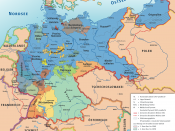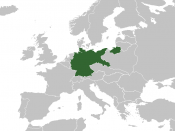The rise of facsism in germany in the 1920's and early 1930's was due to many political, economical and socialogical factors.
The weakness in the running of the government was one of the most important political factors which helped fascism on it's way. The Weimar Republic's faults and problems played a most significant role in the rise of Hitler and and his Nazi Party. As in document... the humuliation of the signing of the treaty of versailles was just the start of many of the government's faults. The German Pop. disagreed in the signing of the treaty and a blame was cast upon the weimar government for causing the humuliation, thereby allowing increased support for extremist parties including hitler and the nazi party.
On the 8th November 1923, Hitler and his movement held a "Munich Putsch" in an attempt to seize the governemnt. But, the putsch failed badly and Hitler was arrested.
Although the putsch was unsuccesful in seizing the governemnt, it was infact an important turning point for the Nazi movement. First, Hitler learnt that power could not be acheived y force. Second, the events in Munich gave hitler and his party instant publicity and he moved rom being a relatviely unknown politician to a national figure. Finally it made it clear to Hitler that he could never hold power without the support of the army.
During it's early years, the Weimar Government faced many problems, which came to a head in 1923. Due to economic fragitility, the german government didn't keep up with it's reperation payments. This led to a problem called hyperinflation as in document .... The rate of inflation was staggering, and the economy was ruined. The German people blamed the Weimar government, which had agreed to pay reparations under the Versailles treaty...


